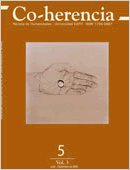De la filosofía a la política. Un esbozo del itinerario intelectual de Hannah Arendt.
##plugins.themes.bootstrap3.article.main##
Keywords
Resumo
Este artículo muestra la evolución del pensamiento de Hannah Arendt, tratando de explicar cómo el totalitarismo la condujo a una crítica de la tradición política desde Platón.
Downloads
Não há dados estatísticos.
Referências
Arendt, Hannah (1960) «Action and the Pursuit of Happiness». Conferencia citada en: Dish, Lisa Jane (1994) Hannah Arendt and the Limits of Political Philosophy. Londres, Cornell University Press.
Arendt, Hannah (1993) La condición humana. Barcelona, Paidós.
Eube, J. Peter (2000) «Arendt’s Hellenism». En: Villa, D. (ed.) The Cambridge Companion to Hannah Arendt. Cambridge, Cambridge University Press.
Hobsbawm, Eric (1995) «El socialismo real». En: Historia del siglo XX. Barcelona, Crítica.
Kohn, Jerome (1994) «Introduction». En: Arendt, Hannah (1994) Essays in Understanding,1930-1954. New York, Harcourt Brace & Co.
Taminiaux, Jaques (1999) «Performativité et grécomanie». En: Revue internationale de philosophie Vol. 2, Nº 208.
Villa, Dana (2000) «Introduction: the development of Arendt’s political thought». En:Villa, Dana (ed.) The Cambridge Companion to Hannah Arendt. Cambridge, Cambridge University Press.
Young-Bruhel, Elizabeth (1993) Hannah Arendt. Valencia, Alfons el Magnánim
Arendt, Hannah (1993) La condición humana. Barcelona, Paidós.
Eube, J. Peter (2000) «Arendt’s Hellenism». En: Villa, D. (ed.) The Cambridge Companion to Hannah Arendt. Cambridge, Cambridge University Press.
Hobsbawm, Eric (1995) «El socialismo real». En: Historia del siglo XX. Barcelona, Crítica.
Kohn, Jerome (1994) «Introduction». En: Arendt, Hannah (1994) Essays in Understanding,1930-1954. New York, Harcourt Brace & Co.
Taminiaux, Jaques (1999) «Performativité et grécomanie». En: Revue internationale de philosophie Vol. 2, Nº 208.
Villa, Dana (2000) «Introduction: the development of Arendt’s political thought». En:Villa, Dana (ed.) The Cambridge Companion to Hannah Arendt. Cambridge, Cambridge University Press.
Young-Bruhel, Elizabeth (1993) Hannah Arendt. Valencia, Alfons el Magnánim
